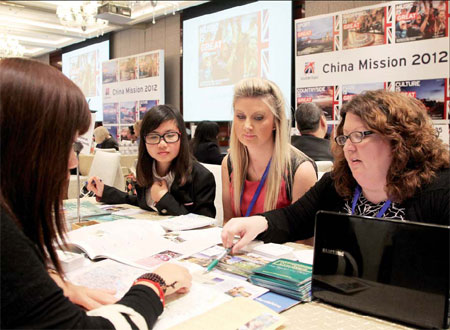Paperwork puts Britain behind
Updated: 2013-01-11 09:43
By Yao Jing (China Daily)
|
|||||||||||
|
Travel agencies in Britain expect to attract more Chinese tourists to the country once the visa process becomes easier. Provided to China Daily |
Push to attract more Chinese tourists hampered by difficulties in obtaining a visa
Growing numbers of Chinese tourists are visiting Britain, but the country has been slow in moving to simplify its visa procedure and encouraging more.
While Chinese travel agencies are planning new tours in Britain for the Chinese New Year holidays next month, there has been little progress on a proposal to allow dual processing of British and Europe-wide Schengen visas, presented to the Home Office in October.
"New routes, including visits to London 2012 Olympic venues, countryside tours and shopping will be highlighted," says Xu Qiqi, general manager of Shanghai Sino-Euro International Travel Agency.
Xu says the number of customers visiting Britain has grown 30 percent annually over the past five years.
 |
"We will attract more customers to the UK once the visa process becomes easier," she says. "The British visa requires more original documentation, and people who want to protect their privacy refuse to hand them in."
Yang Xue, business manager for European travel at CYTS Outbound Travel Co of Beijing, says her company also plans to introduce new and "in-depth" tours - to include horse riding, for example - to let tourists experience more of Britain, but says the country's complicated visa application procedure is a major hurdle.
"Compared with other Western European countries, Britain is hampered by the visa problem, because most customers think it would be much easier to travel to other Schengen countries with just one visa."
The Schengen Agreement, a treaty signed in 1985, allows people to cross borders and travel within 26 European countries on one visa. Chinese tourists can enter countries such as Germany, France and Italy, on a single Schengen visa. Britain and Ireland have remained outside the Schengen area.
Also, the British visa application is 26 pages long and many sections are only available in English. The Schengen one has eight pages.
Research from VisitBritain, the UK's national tourist body, indicates that 61 percent of Chinese people who chose not to visit Britain were put off by the country's difficult visa process. France alone receives at least 25 per cent more Chinese tourists each year than Britain, according to the Financial Times.
British Prime Minister David Cameron and Chancellor George Osborne have expressed frustration that the Home Office has not progressed with reducing visa bureaucracy for Chinese tourists, amid concern that London is failing to attract wealthy Asian travelers, the newspaper has reported.
The visa proposal came as Britain goes through a slow and difficult healing process trying to rebalance its economy. The International Monetary Fund said the British economy shrank by 0.4 percent in 2012.
A record 150,000 visitors arrived Britain from China in 2011, spending 240 million pounds ($387 million; 293 million euros). VisitBritain aims to attract 233,000 Chinese visitors a year by 2020.
In an attempt to boost Britain's travel and shopping credentials, 40 British organizations took part in China Mission 2012 in November, nine of them for the first time. During the three-day trip to China, they met leading travel agents in one-on-one appointments and seminars.
"This year until September, we had 17 percent growth in the number of Chinese tourists, which was the biggest growth from any of VisitBritain's markets in the world," says Keith Beecham, VisitBritain's director of the overseas network. "One in 12 of all the UK's international visitors this year (2012) are from China."
In 1979, when he first visited China, it was one in 150, he says.
"We want to be greedy, we want more, and we are going to invest more in China to get more Chinese visitors."
One strategy is to promote shopping, as Chinese visitors spend on average about 1,600 pounds each per visit, three times more than any other visitor to the country.
The number of independent travelers to Britain has also increased. Numbers from China have risen by 180 percent in the past five years, and their spending by 200 percent.
"This kind of traveler is more interested in finding unique and more authentic experiences, and has an interest in brands," Beecham says.
Bicester Village, a luxury outlet shopping center in Oxfordshire, an hour's drive from London, says Asia was its second biggest market in 2011.
"I have talked with 54 buyers over the past two days and most of them say they will add Bicester to their routes, thanks to our reputation that has been built here," said Helen Peters, senior tourism manager of Value Retail Management (Bicester Village) Ltd, when she was in China with the British trade mission.
By June 2012, 44 percent of the center's non-European visitors came from China, an increase of 70 percent on the corresponding period in 2011.
Luxuries of a bygone age, rather than today's designer ones, are also being held up as an attraction to be developed for overseas visitors.
Not far away in the heart of Buckinghamshire, the stately home Waddesdon Manor receives 330,000 visitors a year - but only 1 percent of them are Chinese.
Built in the 1870s, the manor is a testament to the glory days of the Rothschild family.
"It was the first chance for me to come to China and meet the buyers," says Kim Hallett, head of sales and marketing for Waddesdon Manor, of her China Mission trip in November.
"The feedback we are getting is more interesting, because apart from the main cities of Britain, Chinese tourists now want to walk out and see other things."
The manor has earmarked places for investment, she says.
"China is the biggest overseas market for us. We have been putting in a lot of marketing effort."
In March the manor will introduce an audio-guide for Chinese visitors, and also provide a translator where needed.
Another new supplier on the China Mission was Arsenal Football Club, the English Premier League side based in north London. It is looking to increase its Chinese fan base to 5 million in the next three to five years.
"A very conservative estimate to date is that Arsenal has more than 1 million fans digitally, and 10 percent of them are loyal supporters, which means they only support Arsenal and spend money on AFC merchandising or for matches in China," Gu Tong says, the club's director of international business development for China and Asia.
Following the establishment of the club's Beijing office last May, Gu says it is trying to attract fans to the Emirates Stadium, both for matches and to visit the museum and ground on non-match days.
But despite their hopes for the Chinese market, members of the British tourism trade delegation also expressed concerns about the difficulty in getting the UK visa.
"If they want to do Europe and UK, they need two visas. Sometimes, the choice is if they go to Europe, they can visit five countries with one visa - and that is the decision," says Helen Peters, of Bicester Village.
Fortunately, her company has similar outlet centers in France and Germany, which are also very popular with Chinese tourists.
yaojing@chinadaily.com.cn
(China Daily 01/11/2013 page21)
Today's Top News
Police continue manhunt for 2nd bombing suspect
H7N9 flu transmission studied
8% growth predicted for Q2
Nuke reactor gets foreign contract
First couple on Time's list of most influential
'Green' awareness levels drop in Beijing
Palace Museum spruces up
Trading channels 'need to broaden'
Hot Topics
Lunar probe , China growth forecasts, Emission rules get tougher, China seen through 'colored lens', International board,
Editor's Picks

|

|

|

|

|

|






